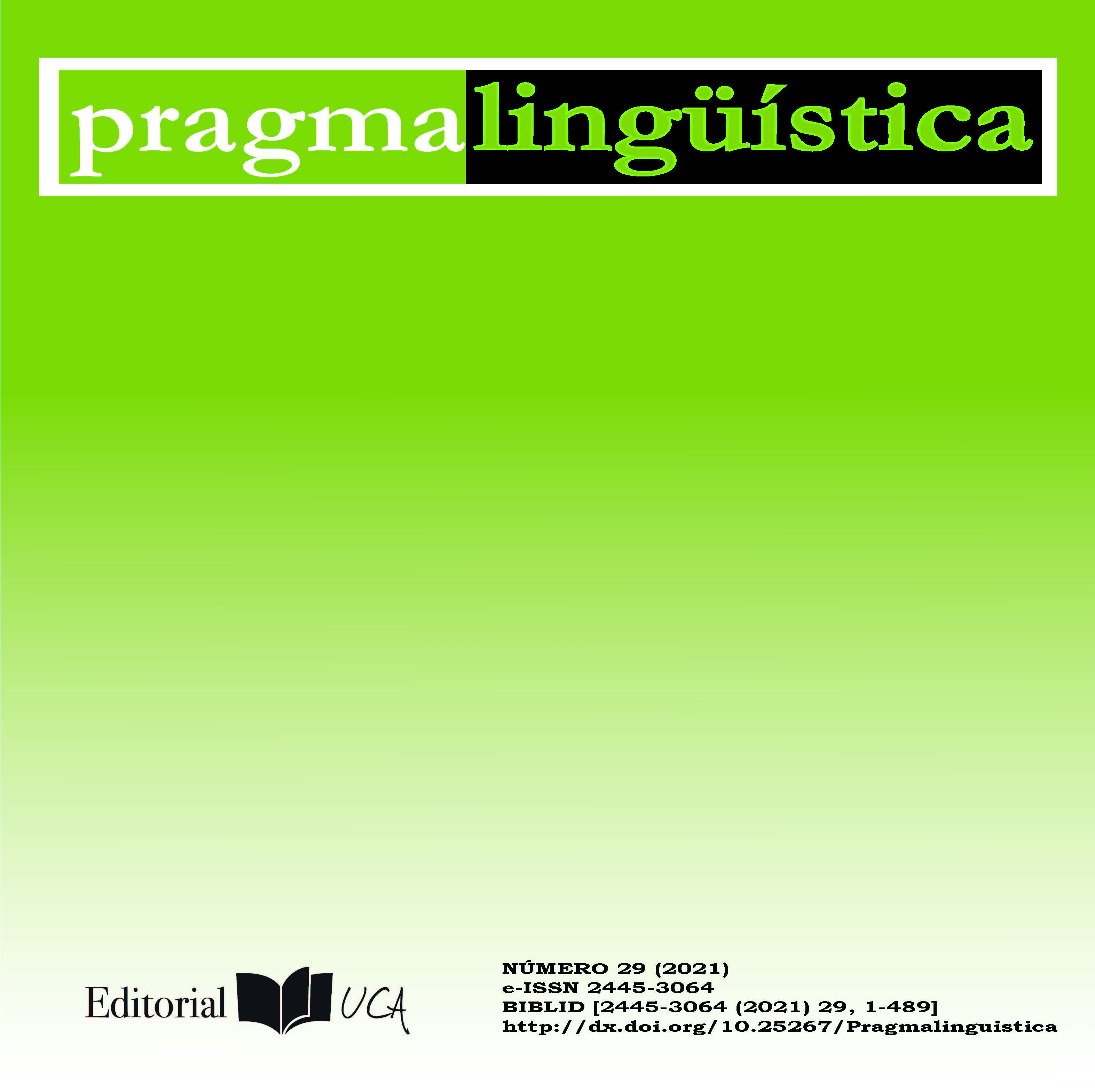El desarrollo de la argumentación en los textos de historia: modalidad epistémica y evidencialidad

DOI
https://doi.org/10.25267/Pragmalinguistica.2021.i29.01Información
Resumen
El objetivo de este trabajo es estudiar el uso de los mecanismos epistémicos y evidenciales para expresar opinión en el entramado argumentativo en textos sobre historia en inglés moderno. Los datos se han tomado del Corpus of History English Texts (CHET), compilado como una subsección del Coruña Corpus en la Universidad de A Coruña (España) (Moskowich y Crespo, 2007). El corpus posee su propia herramienta de análisis denominada Coruña Corpus Tool (CCT). No hay un consenso en cuanto a la relación entre la modalidad epistémica y la evidencialidad. En este documento, nuestro enfoque es disyuntivo (véase Dendale y Tasmowski, 2001) en tanto que se entiende como una categoría distinta de la modalidad epistémica, incluso si existen casos de superposición funcional. Las conclusiones muestran que estos dispositivos tienen un fuerte potencial textual y pueden, por lo tanto, utilizarse para el desarrollo de la argumentación.Palabras clave
Descargas
Cómo citar
Licencia
Derechos de autor 2021 Francisco Alonso Almeida, Francisco José Álvarez-Gil

Esta obra está bajo una licencia internacional Creative Commons Atribución-NoComercial-SinDerivadas 4.0.
Citas
AIJMER, K. (2008): “At the Interface between Grammar and Discourse – a Corpus-Based Study of Some Pragmatic Markers”, Romero-Trillo, J. (ed.): Pragmatics and Corpus Linguistics: A Mutualistic Entente, Berlin: Walter de Gruyter, pp. 11-36.
AIKHENVALD, A. Y. (2006): Evidentiality, Oxford: Oxford University Press.
ALONSO-ALMEIDA, F. & CARRIÓ-PASTOR, M. L. (2017): “Variation and Function of Modals in Linguistics and Engineering Research Papers in English”, Marín-Arrese, J. I., Lavid-López, J., Carretero, M., Domínguez Romero, E., Martín de la Rosa, M.V. & Pérez Blanco, M. (eds.), Evidentiality and Modality in European Languages. Discourse-Pragmatic Perspectives, Bern: Peter Lang, pp. 277-311.
ÁLVAREZ-GIL, F. J. (2018): Adverbs ending in -Ly in Late Modern English. Evidence from the Coruña Corpus of History English Texts, Valencia: Editorial Universitat Politècnica de València.
AUWERA, J. VAN DER & PLUNGIAN, V. A. (1998): “Modality’s Semantic Map”, Linguistic Typology, 2(1), pp. 79-124. https://doi.org/10.1515/lity.1998.2.1.79.
BIBER, D., JOHANSSON, S. LEECH, G., CONRAD, S. & FINEGAN, E. (1999): Longman Grammar of Spoken and Written English, Harlow: Longman.
BOYE, K. & HARDER, P. (2009): “Evidentiality: Linguistic Categories and Grammaticalization”, Functions of Language, 16(1), pp. 9-43. https://doi.org/10.1075/fol.16.1.03boy.
BYBEE, J. L., PERKINS, R. & PAGLIUCA, W. (1994): The Evolution of Grammar: Tense, Aspect and Modality in the Languages of the World, Chicago: The University of Chicago Press.
CHAFE, W. (1986): “No Evidentiality in English Conversation and Academic Writing”, Wallace, C. & Nichols, J. (eds.), Evidentiality: The Linguistic Coding of Epistemology, Norwood: Ablex, pp. 261-272.
COLLINS, P. (2009): Modals and Quasi-Modals in English, Amsterdam: Rodopi.
CORNILLIE, B. (2009): “Evidentiality and Epistemic Modality: On the Close Relationship between Two Different Categories”, Functions of Language, 16(1), pp. 4-62. https://doi.org/10.1075/fol.16.1.04cor.
CORNILLIE, B. & DELBECQUE, N. (2008): “Speaker Commitment: Back to the Speaker. Evidence from Spanish Alternations”, Belgian Journal of Linguistics, 22, pp. 37-62.
CUTTING, J. (2007): Vague Language Explored, London: Palgrave Macmillan. https://doi.org/10.105/9780230627420.
DENDALE, P. & TASMOWSKI, L. (2001): “Introduction: Evidentiality and Related Notions”, Journal of Pragmatics, 33(3), pp. 339-348. https://doi.org/10.1016/S0378-2166(00)00005-9.
EGGINS, S. (1994): An Introduction to Systemic Functional Linguistics, London: Pinter.
FINEGAN, E. (1995). “Subjectivity and Subjectivisation: An Introduction”, Stein D., & Wright, S. (Eds.): Subjectivity and Subjectivisation, Cambridge: Cambridge University Press, pp. 1-15. http://dx.doi.org/10.1017/CBO9780511554469.001.
HALLIDAY, M.A.K., & MATTHIESSEN, C.M.I.M. (2013). Halliday's Introduction to Functional Grammar (4th ed.), London: Routledge. https://doi.org/10.4324/9780203431269
HOYE, L. (1997): Adverbs and Modality in English, Essex: Longman.
HUDDLESTON R. & PULLUM G. (2002): The Cambridge Grammar of the English Language, Cambridge: Cambridge University Press.
HYLAND, K. (2005): Metadiscourse: Exploring Interaction in Writing, London: Continuum.
MOSKOWICH, I. (2017): “Genre and change in the Corpus of History of English Texts”, Nordic Journal of English Studies, 16 (3), pp. 84-106.
MOSKOWICH, I. (2011): “'The Golden Rule of Divine Philosophy' Exemplified in the Coruña Corpus of English Scientific Writing”, Lenguas para Fines Específicos, 17, pp. 167-198.
MUSHIN, I. (2000): “Evidentiality and Deixis in Narrative Retelling”, Journal of Pragmatics, 32(7), pp. 927-57. https://doi.org/10.1016/S0378-2166(99)00085-5.
NUYTS, J. (2001): “Subjectivity as an Evidential Dimension in Epistemic Modal Expressions”, Journal of Pragmatics, 33(3), pp. 383-400. https://doi.org/10.1016/S0378-2166(00)00009-6.
PALMER, F. R. (1986): Mood and Modality. Cambridge Textbooks in Linguistics, Cambridge: Cambridge University Press.
PALMER, F. (2001): Mood and Modality (2nd ed.), Cambridge: Cambridge University Press.
PLUNGIAN, V. A. (2001): “The Place of Evidentiality within the Universal Grammatical Space”, Journal of Pragmatics, 33 (3), pp. 349-357. https://doi.org/10.1016/S0378-2166(00)00006-0.
ROORYCK, J. (2001): “Evidentiality, Part I”, Glot International, 5, pp. 125-133.
WILLETT, T. (1988): “A Cross-Linguistic Survey of the Grammaticization of Evidentiality”, Studies in Language, 12(1), pp. 51-97. https://doi.org/10.1075/sl.12.1.04wil.






